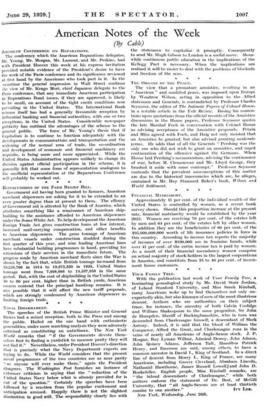NAVAL DISARMAMENT.
The speeches of the British Prime Minister and General Dawes had a mixed reception, both in the Press and among the public. Hailed on the one hand with enthusiastic generalities, under more searching analysis they were adversely criticized as constituting an anticlimax. The New York World remarks that " if the Governments devote them- selves first to finding a yardstick to measure parity they will not find it." Nevertheless, under President Hoover's direction that is precisely what the Navy Department experts are trying to do. While the World considers that the present naval programmes of the two countries are as near parity " as anyone will ever -make them," again the President disagrees. The Washington Post furnishes an instance of eictremer criticism in saying that the " reduction of the United States Navy below what is already provided for is out- of the question." Certainly the speeches have been followed by a reaction from' the popular excitement and anticipation aroused. Happily there is not the slightest diminution in good will. The responsibility clearly lies with
the statesmen to capitalize it promptly. Consequently to send Mr. Hugh Gibson to London is a useful move. Mean- while continuous public education in the implications of the Kellogg Pact is necessary. When the implications are realized it will be easier to deal with the problems of blockade and freedom of the seas.








































 Previous page
Previous page